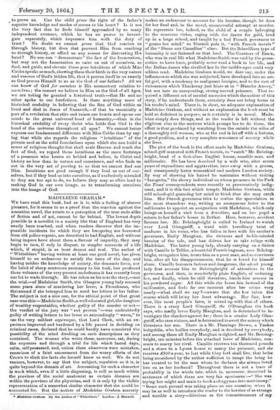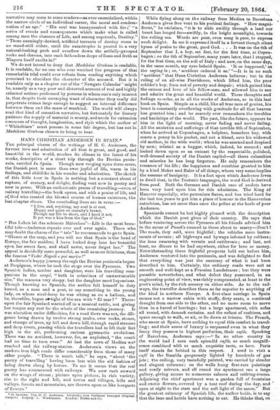MADELEINE GRAHAM.* WE have read this book, bad as it
is, with a feeling of sincere pleasure, for it seems to us a proof that the reaction against the sensation novel, the return to a perception of the true ends alike of fiction and of art, cannot be far behind. The lowest depth possible to a novelist in a society like that of England has very nearly been reached, and when readers discover that the im- possible incidents for which they are hungering are borrowed from old police-reports, are described in bad English, and without being impure have about them a flavour of impurity, they may begin to turn, if only in disgust, to simpler accounts of a life which, if stupid, is as least decent and real. The author of " Whitefriars " having written at least one good novel, has given himself to an endeavour to satisfy the taste of the day, and having neither the knowledge of society, the dramatic force, nor the habit of sharp sentences necessary to his task, has produced three volumes of the very poorest melodrama it has recently been our lot to wade through. He has taken as his text the story,—not the trial,—of Madeleine Smith, the Glasgow young lady accused some years since of murdering her lover, a Frenchman, who threatened if she betrayed him to send her letters to her father. The subject is not a nice one, for the ethical point of that great case was this:—Madeleine Smith ,a well educated girl, the daughter of wealthy respectables, whether guilty of the murder or not— the verdict of the jury was "not proven "—was undoubtedly guilty of writing letters to her lover so astoundingly "warm," to use the very mildest equivoque, that Lord Clerk, with an ex- perience improved and hardened by a life passed in deciding on criminal cases, declared that he could hardly have conceived the possibility of the mind dwelling on such descriptions as they contained. The woman who wrote them, moreover, sat, during the exposure and through a trial for life which lasted days, calm, self-possessed, and, unless close observers were mistaken, conscious of a faint amusement from the weary efforts of the Crown to elicit the facts she herself knew so well. We do not venture, however, to say that the subject, repulsive as it is, is quite beyond the domain of art. Accounting for such a character is work which, even if a little disgusting, is still as much within
the province of the social anatomist as certain diseases are within the province of the physician, and it is only by the visible representation of a somewhat similar character that she could be accounted for. But the author of Madeleine Graham scarcely
* Madeleine Graham. By the Author of " Whitefriare" London: J. MazwelL
makes an endeavour to account for his heroine, though he does for her final and, in the novel, unsuccessful attempt at murder. He represents her, indeed, as the child of a couple belonging to the nouveaux riches, raging with the desire for gold, bred up in a large school, and taught by a bad French governess to "guano her mind," as Disraeli puts it, "with French novels" of the "Dame flux Camellias" class. But the Brinvilliers type of humanity is not fattened on that food. The Countess of Essex, who was in real life what Madeleine Smith was said by the prose- cution to have been, probably never read a book in her life, and the Italian dames who rivalled her in the middle-ages could very seldom read. Madeleine Graham would, we dare say, under the influences to which she was subjected, have developed into an art- ful girl, with a tendency to malignant intrigue, and to the sort of viciousness which Thackeray just hints at in "Blanche Amory;' but not into an unrepenting, strong-nerved poisoner. That re- quired a different set of mental narcotics which the author of this story, if he understands them, certainly does not bring home to his reader's mind. There is, in short, no adequate explanation of Madeleine Graham, and without an explanation the book must be held as deficient in purpose, as it certainly is in moral. Made- leine_ simply does things, and as the reader is left without the slightest clue to the motives which prompt her to do them, the effect is that produced by watching from the outside the wiles of a thoroughly evil woman, who at the end is let off with a fortune, a good position, and a very complete assurance of secrecy while she lives.
The plot of the book is the effort made by Madeleine Graham, school-girl manured with French novels, to "catch" Mr. Behring- bright, head of a first-class English house, sensible man, and millionaire. He has been deceived by a wife who, after seven years of expenditure and aggravation, runs away with a groom, and consequently hates womankind and modern London society. By way of showing his hatred he maintains without visiting "Incognita," the showy individual on whose presence in the Park the Times' correspondents were recently so provocatively indig- nant, and it is this fact which tempts Madeleine Graham, while still school-girl guanoing her mind to think that she may catch him. Her French governess tries to realize the speculation in the most shameless way, writing an anonymous letter to the millionaire to appoint an assignation with Madeleine, which only brings on herself a visit from a detective, and on her pupil a return to her father's house in Belfast. Here, however, accident favours her. Mr. Behringbtight is called to Ireland to watch over Lord Glengariff, a ward with hereditary taint of madness in his veins, who has fallen in love with his mother's governess, Emily Maughan, the virtuous and feeble-minded heroine of the tale, and has driven her to take refuge with Madeleine. The latter young lady, already carrying on a liaison with Camille le Tellier, a beautiful French bagman, sees Behting- bright, recognizes him, treats him as a poor man, and so convinces him, after all his disappointments, that he is loved for himself alone. Camille becomes furious and dangerous, the adroit young lady first accuses him to Behringbright of attentions to the governess, and then, in wonderfully plain English, of seducing her, and finally, when he still threatens, hands him arsenic in his powdered sugar. All this while she loves him instead of the millionaire, and feels for one moment after her crime very nearly—what shall we say ?—aware that she has taken the course which will bring her least advantage. Her fate, how. ever, like most people's fates, is mixed up with that of others. There is a crazy Lord Glengariff, the O'Donoghue the book says, who madly loves Emily Maughan, and is determined to in- vestigate the slanders against her; there is a crazier Lady Glen- gariff, who sees visions, and is determined to avert the misery which threatens her sou. There is a Mr. Flamingo Brown, a Yankee hobgoblin, who bullies everybody, and is deceived by everybody, and among them all Emily Maughan is righted, and Mr. Behring- bright, ten minutes before the attached lover of Madeleine, con- sents to marry her rival. Camille receives ten thousand pounds and a share in a Lyons house to marry the poisoner, and she receives X300 a year, to last while they both shall live, that bribe
being considered by the author sufficient to tempt the being he has created to let the man whom he declares she always loved live on as her husband 1 Throughout there is not a trace of probability in the whole tale, which is, moreover, described in sentences of which these are very fair specimens:—" She was trying her might and main to hook a clergyman into matrimony."
"Some such perusal was taking place on one occasion, when it may be as well to introduce the reader to the heroine of as strange and terrible a story—frivolous as the commencement of my
narrative may seem to some readers—as over essentialized, within the narrow circle of an individual career, the moral and condem- nation of an age." "His soul was honeycombed with fire ;" "a series of events and consequences which make what is called among men the chances of Life, and among supernals, Destiny." "These cunningly-devised, artificial torrents of destiny come to no stand-still either, until the catastrophe is poured in a very natural-looking gush and overflow down the artfully-grouped rocks and chasms, into such fathomless deeps of foam and froth as Niagara itself exults in!"
We do not intend to deny that Madeleine Graham is readable. It is readable, for no one who ever watched the progress of that remarkable trial could ever refrain from reading anything which promised to elucidate the character of the accused. But it is readable only as a chapter out of the "Newgate Calendar" might be, namely as a very poor and distorted account of real and highly criminal actions performed by persons in whom one's only interest is, that despite their unvarying want of character they really did perpetrate crimes large enough to suggest an internal difference between them and the mass of mankind. The world will always read that kind of sensation narrative, but fortunately for literary patience the supply of material is scanty, and needs for extension resources of thought, imagination, and style which the author of " Whitefriars" must possess in some fair degree, but has not in Madeleine Graham chosen to bring to bear.































 Previous page
Previous page